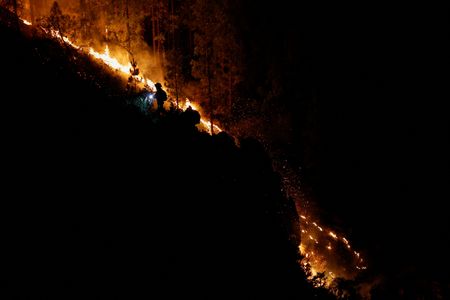By Borja Suarez and Corina Pons
TENERIFE, Canary Islands, Spain (Reuters) -A wildfire raging on the Spanish island of Tenerife has slowed its advance thanks to firefighters's efforts and more favourable weather, allowing authorities to lift some restrictions for residents on Friday.
The blaze broke out on Wednesday in a mountainous national park around the Mount Teide volcano - Spain's highest peak - amid hot and dry weather. It burned through nearly 4,000 hectares (9,900 acres) of vegetation, blanketing the island with smoke and ash.
More than 4,500 people were evacuated from their homes as a precaution as of Thursday, although no buildings have been destroyed. Almost 4,000 residents had been ordered to stay home.
Civil protection chief Montse Roman told a news conference that with an improved situation around the fire's head, restrictions on movement in areas further away from the blaze could be lifted.
Around 1,700 people would still remain under confinement, he said. There were no more evacuations on Friday.
"The fire and the weather have behaved in a more normal fashion after showing very unusual behaviour earlier. We've managed to work more intensely during the night," Canary Islands regional leader Fernando Clavijo said.
He has called the wildfire the most complex the Atlantic Ocean archipelago has faced in 40 years, due to a combination of hot, dry and windy weather, as well as difficult terrain.
"The smoke is the worst thing we've seen," said one evacuee, Francisco Lopez, 57, who left his home on Thursday with his family, three horses, a dog and some chickens to stay at a friend's farm.
The blaze started in several places by a motorway, meaning it could have been caused by human activity, deliberately or not, authorities have said.
The island's two airports were operating normally.
Scorching heat and dry weather this summer have contributed to unusually severe wildfires in Europe and Canada. Blazes on Hawaii's Maui island earlier this month killed more than 110 people and wrecked the historic resort city of Lahaina.
Scientists say climate change has led to more frequent and more powerful extreme weather events.
The Canary Islands typically experience spring-like temperatures all year but temperatures rose above 40 degrees Celsius (104 Fahrenheit) during a heatwave last week, leaving many areas bone dry.
Local forestry engineer Juan Guzman told Television Canaria that while climate change was making things worse, the main problem was the abandonment of rural land and forests as the region shifted its focus to tourism in the past few decades.
"The abandoned forest accumulates combustible material. Unfortunately...fires will be more and more frequent," he said.
(Writing by Andrei KhalipEditing by Frances Kerry and Angus MacSwan)








